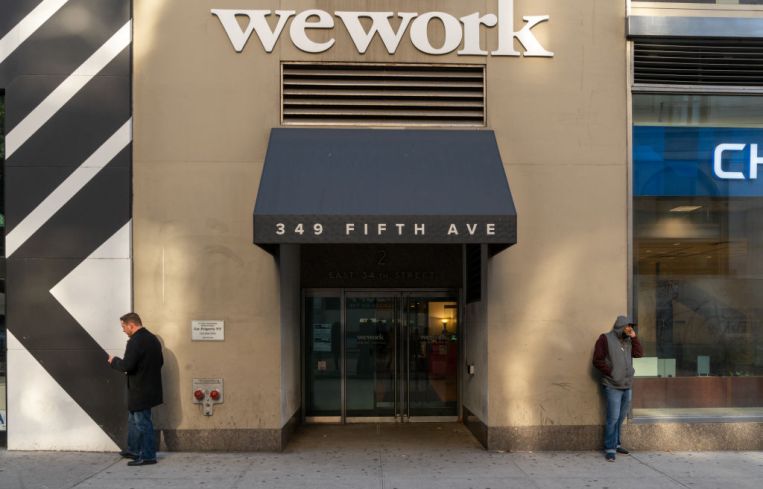WeWork Sues SoftBank Over Cancelled $3B Tender Offer
The special committee of the board of WeWork sued SoftBank, claiming the pull out of the offer was a breach of contract.
By Nicholas Rizzi April 7, 2020 10:57 am
reprints
The special committee of the board of WeWork filed a lawsuit against majority backer SoftBank Group over the Japanese bank’s cancellation of its deal to buy $3 billion worth of shares in WeWork from stockholders, which included ousted CEO Adam Neumann’s nearly $1 billion golden parachute, the committee announced this morning.
The suit comes a week after SoftBank pulled out of the deal, known as a tender offer, claiming WeWork failed to meet several conditions by April 1, including not getting antitrust approvals or closing joint ventures in China. SoftBank also blamed several government investigations into WeWork that started after its botched initial public offering last summer along with impacts from the worldwide coronavirus pandemic.
In its suit, WeWork’s special committee argued the cancellation of the deal was a breach of contract in the master transaction agreement (MTA) and called it a “wrongful action.”
“SoftBank’s failure to consummate the tender offer is a clear breach of its contractual obligations under the MTA as well as a breach of SoftBank’s fiduciary obligations of WeWork’s minority stockholders, including hundreds of current and former employees,” the special committee said in a statement. “The special committee regrets the fact that SoftBank continues to put its own interests ahead of those of WeWork’s minority stockholders.”
A spokesperson for SoftBank said in a statement nothing in the suit “credibly refutes SoftBank’s decision to terminate the tender offer” and it plans to “vigorously defend” against it.
“Their filing today is a desperate and misguided attempt now to rewrite that agreement and to rewrite the history of the past six months,” the spokesperson said. “The special committee will not prevail in this mistaken attempt to force SoftBank to purchase their shares when it is not legally obligated to do so.”
WeWork’s special committee argues in its lawsuit, filed in Delaware court, that the MTA for the tender offer only stipulated that the closing date be delayed if the terms were not met, not canceled completely. It also blames the closing of joint ventures in China, a reason SoftBank cited for withdrawing from the deal, on SoftBank itself.
“SoftBank first tried to thwart the roll-up of WeWork’s joint venture in China, and then claimed that the conditions to closing the tender offer — one of which is the roll-up of WeWork’s joint venture in China — were not met,” the special committee said in a statement. “This, and SoftBank’s other claims related to its failure to complete the tender offer, are therefore either disingenuous or irrelevant to SoftBank’s contractual and other obligations.”
While SoftBank has already pumped $5.45 billion into WeWork since October 2019 and a total of $14.25 billion in the company since its inception, the tender offer was a huge chunk of its multibillion-dollar bailout for the trouble coworking giant.
In a statement last week, SoftBank said the halting of the deal will mostly impact Neumann, his family and institutional investors like venture capital firm Benchmark. WeWork employees only had about 10 percent of the shares that were part of the offer, according to SoftBank.
A source with knowledge of the offer previously told Commercial Observer that $450 million of it was allocated to current and former employees and Bloomberg reported that the coworking giant’s workers planned their lives — starting new businesses or buying houses — around the money they’d receive.
“They’re trying to leverage the negative press that has followed Adam since the IPO by saying ‘This is just a billionaire making more money,’ ” former WeWork employee Teddy Kramer told Bloomberg.
SoftBank will also be allowed to hold back $1.1 billion in financing to WeWork if the tender offer doesn’t happen, the New York Times reported.
The special committee — which was formed in October 2019 by members of WeWork’s board “ring-fence” the company’s financial deliberations from SoftBank — had previously announced plans to sue SoftBank over the cancellation of the tender offer.
WeWork has faced a series of blows since it announced plans to go public last summer. Investors were wary of WeWork’s cash-burning model and later reports of Neumann’s erratic behavior and management style, including passing out shots of tequila after announcing layoffs.
The company lost Neumann in September 2019 after he was pushed out by investors, had its valuation plummet by about $39 billion and laid off thousands of employees. In an interview with Forbes that was published online yesterday, SoftBank-founder Masayoshi Son admitted he spent too much money and put too much faith in Neumann.
“We paid too much valuation for WeWork, and we did too much believe in the entrepreneur,” Son told Forbes. “But I think even with WeWork, we’re now confident that we put in new management, a new plan, and we’re going to turn it around and make a decent return.”
In February, WeWork tapped legendary real estate figure Sandeep Mathrani — credited with getting mall owner GGP out of one of the biggest real estate bankruptcies in history — to become the new CEO. It has also begun selling off some of its acquisitions to focus on the shared-office model it started with.
WeWork has faced troubles because of the coronavirus pandemic, which has left most of its locations empty, and has been reaching out to landlords across the world to turn leases into partnership agreements and cut as much as 30 percent from its nearly $47 billion in rent liabilities, Bloomberg reported.We
SoftBank has also been feeling the crunch from the coronavirus and announced a plan last week to sell off $41 billion worth of assets to survive, Fortune reported.
Updated: This story has been updated to include a statement from SoftBank Group.



